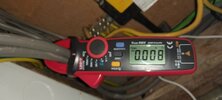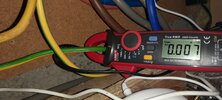- Joined
- 27 Jan 2008
- Messages
- 24,903
- Reaction score
- 2,877
- Location
- Llanfair Caereinion, Nr Welshpool
- Country

The central heating did run on a RCBO until solar panels fitted, no problems, when solar panels fitted it was transferred to a UPS supply, so no longer fed through the RCBO, so I fitted a RCD FCU, but when CH started it tripped, so put old FCU back, thought summer is time to fiddle, not winter.
So out of interest measured the current through the earth cable, and no where near 15 mA, there is some current around 5 mA, but not enough to trip a RCD.
Same measuring meter tails, earth leakage is well within limits. Not used an insulation tester yet, that's a summer job, but it does seem something to do with using a RCD FCU instead of a RCBO.
I could not get a type A RCD FCU from City Electricial factors, so wonder if just unlucky, my RCD tested died, so can't test the RCD without borrowing one from work, have considered setting up a test so can simple plug in to test and take it to work to test, here no socket outlets without RCD protection. There are at work.
But does seem like a faulty RCD FCU. But wondered if anyone else has had problems with RCD FCUs as to date found very few faulty RCD's
So out of interest measured the current through the earth cable, and no where near 15 mA, there is some current around 5 mA, but not enough to trip a RCD.
Same measuring meter tails, earth leakage is well within limits. Not used an insulation tester yet, that's a summer job, but it does seem something to do with using a RCD FCU instead of a RCBO.
I could not get a type A RCD FCU from City Electricial factors, so wonder if just unlucky, my RCD tested died, so can't test the RCD without borrowing one from work, have considered setting up a test so can simple plug in to test and take it to work to test, here no socket outlets without RCD protection. There are at work.
But does seem like a faulty RCD FCU. But wondered if anyone else has had problems with RCD FCUs as to date found very few faulty RCD's


